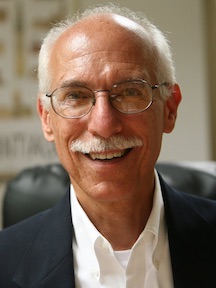By Jacob Gambrell
George D. Greenia has become the first American to be awarded the XXIII International Prize Grupo Compostela-Xunta de Galicia for his “prolific academic trajectory, connection with Galicia, and contribution to the dissemination of the Jacobean phenomenon.” He is Professor Emeritus of Modern Languages at the College of William and Mary and the co-founder of the William and Mary Program in Medieval and Renaissance Studies and the founder of the William and Mary Institute of Pilgrimage studies. Much of his research is on the Camino de Santiago or the Way of St. James in Galicia, an autonomous community in North Western Spain. Greenia has a long history of service to ΦBK, and this latest award is one of many honors he has received throughout his academic career.
In 1994, the Compostela Group of Universities (CGU) was founded to establish a university-network for collaboration to help to preserve the cultural and historical heritage that emerged along the Camino de Santiago. Two years later, CGU along with the Galician Regional Government established the Compostela Prize, “a reward granted annually to one person or institution that has stood out due to his work in favour of the diffusion of international projects or ideas, dealing specially with the promotion of the European common ideal, the education and the preservation of our cultural heritage.” In receiving this prestigious award, he joins the company of Vaclav Havel, famous Czech Politician; Carla del Ponte, General Prosecutor at the International Criminal Tribunal for genocides in the former Yugoslavia and Rwanda; and Wladyslaw Bartoszewski, Auschwitz survivor, historian, and Polish Politician. He received the award, a golden shell symbolizing the CGU and a cash prize he will donate to the William and Mary Institute for Pilgrimage Studies, at the 25th General Assembly of the CGU at the University of Guadalajara.
Greenia has studied the Camino de Santiago extensively. He has written or edited more than 30 volumes and 8,000 pages of literature about the Camino and other aspects of medieval material culture such as books, religious traditions, travel, and art. He spends most summers leading groups of students from William and Mary down the Camino de Santiago and has logged over 4,000 miles on the Camino and other pilgrimage trails in Europe and the Americas. In 2007, he was recognized for his work when he was knighted by King Juan Carlos I of Spain and received the Encomienda of the Order of Isabel the Catholic for his promotion of Spanish literature in the United States.
Greenia graduated from Marquette University in 1975 where he studied Spanish and Latin and was inducted into Phi Beta Kappa. He then attended the University of Michigan where he received his master’s and Ph.D. in Spanish. When he was first invited to join ΦBK, he had no idea what the honors society was. Due to financial concerns, he decided to ignore the invitations. However, one of his closest professors offered to pay the induction fee for him and he said that that gesture “marked my understanding of what ΦBK stands for from that moment on.”
That first understanding of the values of ΦBK led to a lifetime of service to the organization. He was involved with ΦBK for 30 years at William and Mary. He was elected to the ΦBK Senate in 2009 and served on the Executive Committee for six years. In 2015, he became the first person to be awarded both the ΦBK President’s Award and the Judith F. Krug Medal.
In addition to his service to ΦBK, he also has a long history of service to the LGBTQ community at William and Mary. For 24 years, he served as a faculty facilitator of the Gay Student Support Group every Monday night. He also has fought for establishing non-discrimination policies and domestic partner benefits at William and Mary. George Greenia’s career has exemplified the ideals of Phi Beta Kappa both through his scholarship and his service to others.
Jacob Gambrell is a senior at the University of Mississippi majoring in international studies and Spanish. He was inducted into Phi Kappa Beta there in 2018. The University of Mississippi is home to the Beta of Mississippi chapter of Phi Beta Kappa.




